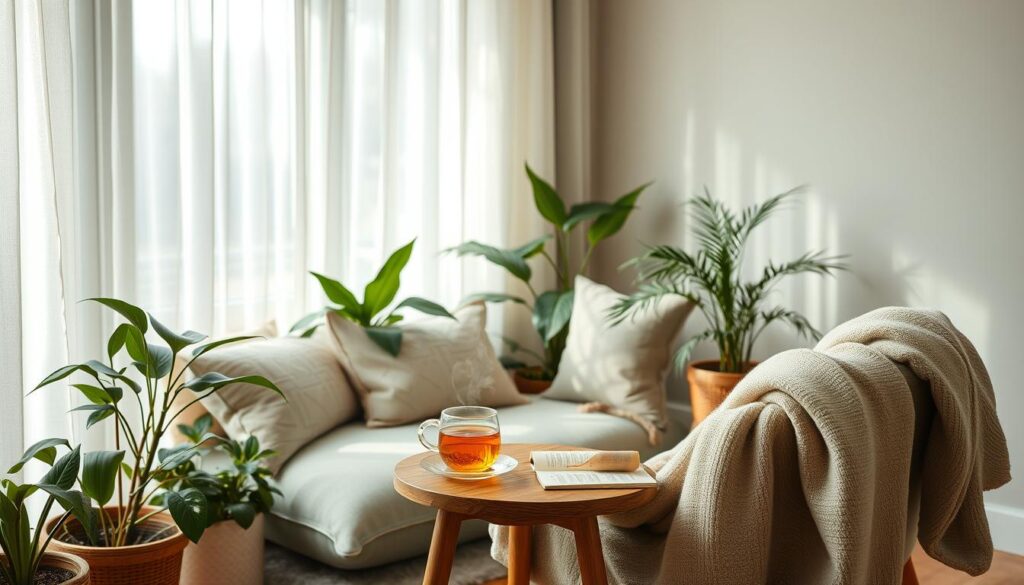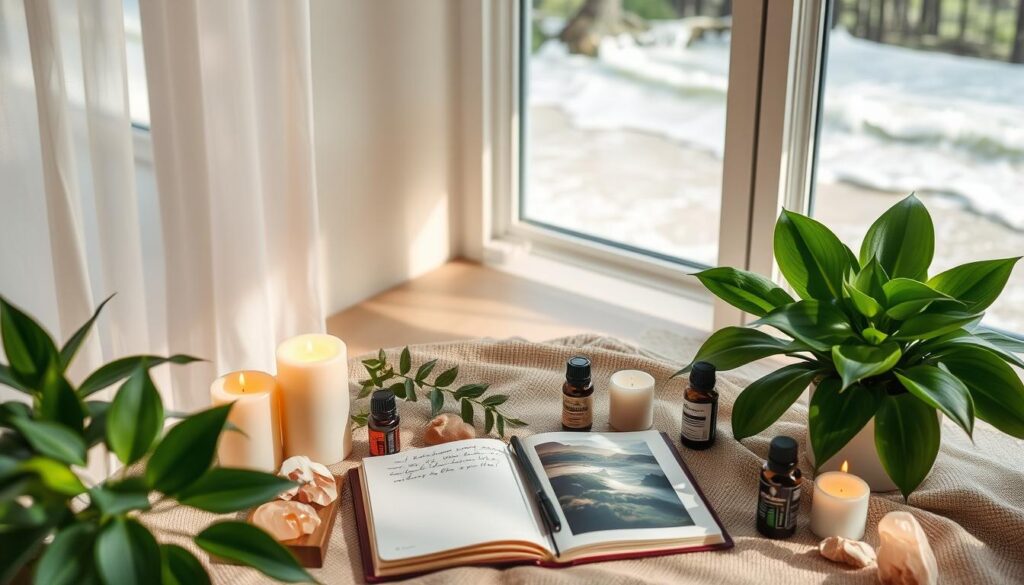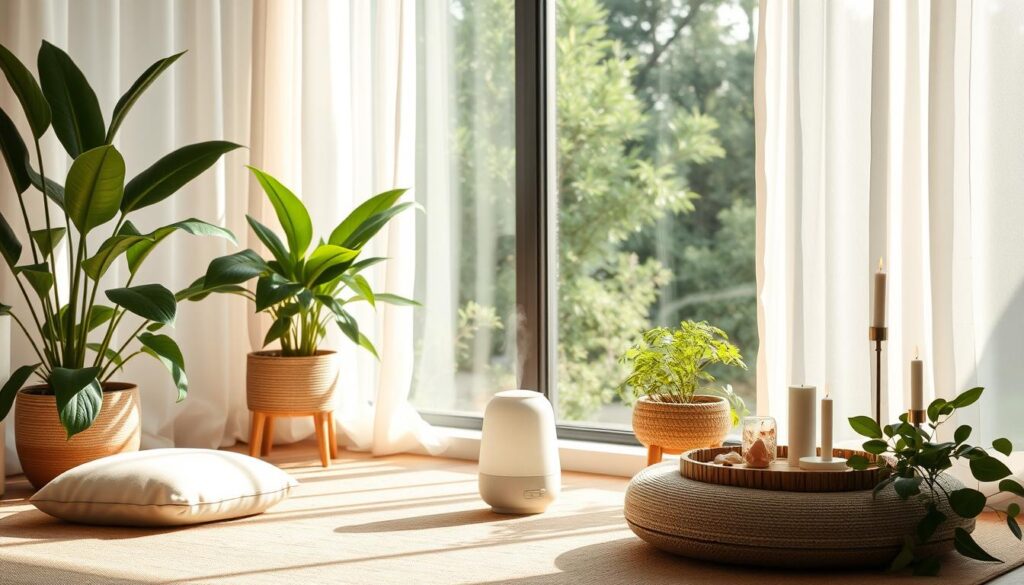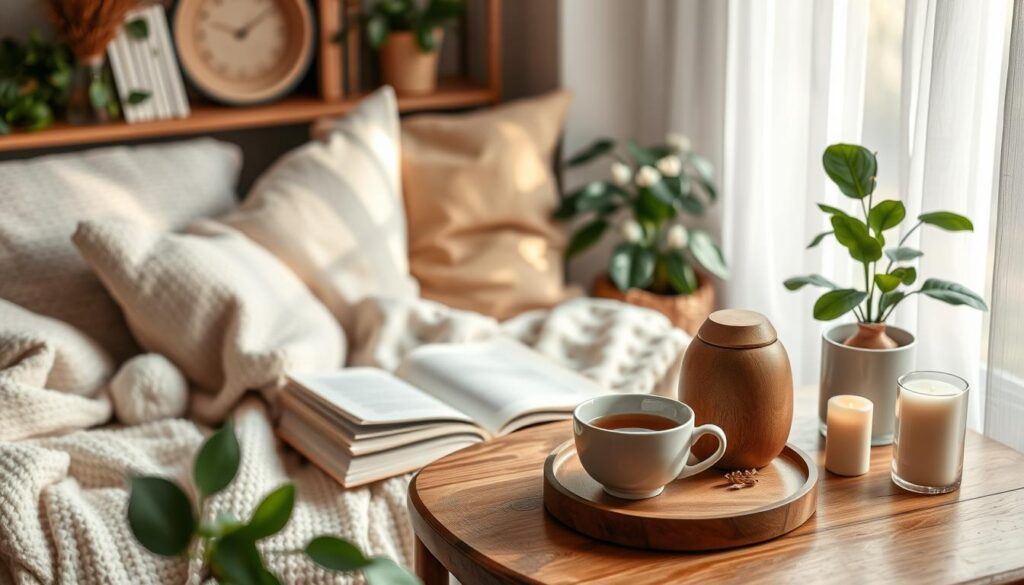In today’s fast world, self-care is more important than ever. It’s key to add self-care rituals to our daily lives to keep our minds and hearts healthy. This article shares ten ways to refresh and recharge, from mindfulness to nutrition tips.
These ideas can greatly improve our physical health and overall well-being. Self-care is not just a trend; it’s a necessary promise to ourselves. It leads to a more balanced and fulfilling life.
Key Takeaways
- Self-care rituals are essential for mental and emotional wellbeing.
- Incorporating daily self-care ideas can enhance overall wellness.
- Mindfulness practices help improve mental clarity.
- Nutrition plays a key role in physical vitality.
- Creating a calming environment aids in effective relaxation.
- Engaging with nature fosters renewal and connection.
Understanding the Importance of Self-Care
Self-care is crucial in today’s fast world. We all deal with daily stress that can cause anxiety, fatigue, and burnout. By practicing self-care regularly, we build emotional strength.
Adding mental health self-care tips to our daily lives improves our mental state. Simple acts like relaxing, exercising, and enjoying hobbies bring joy. Every mindful choice boosts our overall well-being.
Studies show that ignoring self-care can make stress worse and lead to serious health problems. But, using wellness practices for self-care can make us happier and more productive. Seeing self-care as a must, not a luxury, helps us live a balanced life.

Understanding self-care’s value changes our lives for the better. It affects our relationships, work, and happiness. By caring for ourselves, we lead a life full of purpose and well-being.
Setting Intentions for Your Self-Care Rituals
Setting intentions for self-care is key to a fulfilling routine. By setting clear goals, you can dive deeper into your self-care activities. This makes your self-care more purposeful and enjoyable.
Journaling is a great way to start. Writing down your goals helps clarify your thoughts and keeps you committed. It lets you focus on what you need and want, making self-care more personal.
Vision boards are also helpful. They let you see your goals through images and words. This makes it easier to stay on track with your self-care plans, keeping your mind positive.
Reflection exercises boost self-awareness and track your progress. Taking time each week to check in with your feelings and body helps shape your self-care. It ensures it meets your needs.
Intentions do more than just plan. When you set specific, achievable goals, you’re more likely to stick with self-care. This leads to lasting, positive changes in your life.

Using these methods, you can build a strong self-care framework. Here’s a table showing different tools and their benefits for setting self-care intentions:
| Tool | Benefits |
|---|---|
| Journaling | Enhances emotional clarity and commitment. |
| Vision Boards | Visual representation of goals and aspirations. |
| Reflection Exercises | Promotes self-awareness and personal growth. |
| Routine Evaluations | Ensures practices remain aligned with needs. |
Mindfulness Practices for Mental Clarity
Mindfulness techniques are key for better mental clarity and emotional health. They help us stay in the present moment. This can lower anxiety and boost focus. Adding these practices to your daily routine is a great way to find peace and balance. Here are some mindfulness practices that can help you relax.
Meditation Techniques
Meditation is a core part of mindfulness. It helps us focus deeply and find calm. Here’s how to start:
- Find a quiet spot with few distractions.
- Sit comfortably with your back straight and eyes closed.
- Take a few deep breaths to relax your body.
- Focus on your breath. Breathe in deeply through your nose, then out slowly through your mouth.
- If your mind drifts, bring it back to your breath.
- Do this for 5-10 minutes a day, increasing as you get more comfortable.
Meditation not only boosts mindfulness but also helps manage stress. It builds emotional strength, making it a crucial part of self-care.
Breathing Exercises
Breathing exercises are simple yet powerful. They help us relax and can fit into any day. Here are two easy ones:
- Box Breathing: Breathe in for four counts, hold for four, breathe out for four, and pause for four before starting again.
- Deep Belly Breathing: Put one hand on your chest and the other on your belly. Breathe in deeply through your nose, letting your belly rise while your chest stays still. Breathe out through your mouth as your belly falls.
Doing these breathing exercises regularly can improve your mental clarity. They help you relax and find a calm state of mind.

| Mindfulness Technique | Benefits |
|---|---|
| Meditation | Improves focus, reduces stress, enhances emotional resilience. |
| Breathing Exercises | Promotes relaxation, increases oxygen flow, calms the mind. |
Physical Self-Care: Exercise and Movement
Adding physical self-care to your daily routine has many exercise benefits for your overall health. Regular activity boosts both your body and mind. Whether it’s a casual walk or a structured workout, it can make you feel better and more energetic.
Studies show that exercise releases endorphins, known as “feel-good” hormones. These hormones help reduce stress and anxiety, making exercise a key part of wellness practices for self-care. Adding different types of exercise to your routine can make self-care more enjoyable.
- Take brisk walks during lunch breaks.
- Join a local fitness class or group.
- Utilize online workout videos at home.
- Engage in fun activities like dancing or cycling.
- Incorporate stretching or yoga for flexibility.
Each activity can help build a strong physical self-care plan. The most important thing is to find exercises you enjoy. Creating a routine not only keeps you physically fit but also boosts your emotional strength.
| Type of Exercise | Physical Benefits | Mental Benefits |
|---|---|---|
| Walking | Improves cardiovascular health | Reduces stress |
| Yoga | Enhances flexibility | Promotes relaxation |
| Cycling | Builds muscle strength | Boosts mood |
| Group Classes | Encourages social interaction | Increases motivation |
Choosing physical self-care through movement is a big step towards better well-being. Trying out different activities helps you find what works best for you. This makes self-care a lasting part of your life.
Nutrition Tips for Optimal Wellness
Good nutrition is key to feeling well. Eating the right foods can boost your health and mood. This link between food and mood is crucial for a better life.
Starting wellness practices for self-care is easy. Here are some tips:
- Focus on whole foods: Eat more fruits, veggies, whole grains, and lean proteins.
- Monitor portion sizes: Pay attention to how full you feel to avoid overeating.
- Create balanced meals: Make sure your meals have carbs, proteins, and fats.
- Stay hydrated: Drinking water keeps your energy up and health in check.
Adding these self-care rituals for relaxation can help your mind and body. Here’s a table showing foods that can lift your mood:
| Food | Benefits |
|---|---|
| Leafy Greens | Rich in magnesium, which may help reduce anxiety |
| Blueberries | Loaded with antioxidants, promoting brain health |
| Salmon | High in omega-3 fatty acids, supporting mental clarity |
| Nuts and Seeds | Provide essential fatty acids that assist in stabilizing mood |
Following these nutrition tips can make you feel great and think positively. A healthy diet is a big step towards a better life.
Self Care: Creating a Calming Environment
Creating a calming environment is crucial for self-care. A well-designed space can greatly improve your mental health. It becomes a place to find balance. Simple calming environment tips can turn any space into a personal retreat.
Lighting is key for setting a self-care mood. Soft, natural light is calming, while harsh lights can cause anxiety. Using dimmable lamps or candles can add a peaceful glow.
Decor choices also affect your mood. Soft colors and organic textures can make you feel calm. Personal artwork can bring joy and uplift your emotions.
Sound is important too. Calming music or nature sounds can make you feel tranquil. Sound machines or water features can create a peaceful sound environment.
Keeping spaces tidy is also vital. A clean environment reduces stress and clears your mind. Organizing helps you feel more in control, supporting self-care.
Adding nature elements can make your space even more calming. Houseplants improve air quality and add comfort. Aromatherapy with essential oils like lavender or chamomile can enhance the cozy atmosphere.
By adding these calming elements to your daily life, you can create nurturing spaces for self-care. These practices can lead to a healthier mindset and better emotional well-being.
Creative Outlets for Emotional Release
Engaging in creative self-care activities is a powerful way to release emotions. Artistry helps us express feelings that are hard to say out loud. Activities like painting, writing poetry, or making music connect us to our inner selves.
Studies show that creative hobbies are good for our mental health. People who create often feel less anxious and depressed. Creating helps shift our focus from stress to self-expression, improving our mental clarity and emotional balance.
- Start a daily journal to capture thoughts, feelings, and reflections.
- Experiment with painting or drawing, regardless of skill level.
- Take up photography to capture the beauty of everyday life.
- Join a local music group or experiment with playing an instrument.
- Try your hand at crafting, such as knitting, pottery, or DIY projects.
Adding these creative activities to your daily life can boost your emotional health. It lets you explore yourself and find new joys. Creativity helps us connect with ourselves and feel more fulfilled.
Digital Detox Techniques to Refresh Your Mind
In today’s fast-paced digital world, stepping back from screens is key for mental health. Too much screen time can make us anxious and less focused. This shows we need good digital detox strategies. By using certain tactics, we can take back our mental space and improve our well-being.
To start a balanced digital life, try these digital detox strategies:
- Establish Screen Time Limits: Set daily timeframes for device usage to prevent mindless scrolling.
- Create Tech-Free Zones: Designate areas in the home where devices are not allowed, encouraging face-to-face interactions.
- Schedule Regular Breaks: Take short breaks from devices to recharge and refresh techniques like walking or deep breathing.
- Engage in Offline Activities: Explore hobbies that do not involve screens, such as reading or gardening, which contributes to mental health self-care.
Adding these digital detox techniques to our daily routines can greatly improve our mental clarity and health. By cutting down on screen time, we can feel more focused and calm. This positively changes our lives.
Connection with Nature for Renewal
The *nature connection benefits* are vast and varied. Being outside can boost mood and lower anxiety. It’s key for good mental health.
Nature offers a calm setting for relaxation and recharging. Here are some ways to bring nature into self-care:
- Hiking on local trails to connect with the landscape and appreciate its beauty.
- Gardening, which offers a soothing interaction with the earth and a sense of accomplishment.
- Spending quiet moments in a park, allowing the sounds and sights of nature to create an atmosphere of tranquility.
Studies show even short outdoor times can lower stress. Outdoor self-care boosts mindfulness and energy. It helps us disconnect from daily life and reconnect with ourselves.
Regular nature time can change how we see life. These practices nourish our bodies and spirits. They show the value of spending time outside on purpose.
Relaxation Techniques for Stress Relief
In today’s fast world, learning to relax is key to managing stress. People can improve their emotional health by adding self-care rituals to their day. Here are some great ways to relax:
- Progressive Muscle Relaxation: This method involves tensing and relaxing muscles one by one. It helps reduce tension and brings calm.
- Guided Imagery: These exercises take you to peaceful places like beaches or forests. They help lower anxiety and bring peace.
- Aromatherapy: Essential oils, like lavender and chamomile, can improve mood and create a calm space.
Adding these techniques to your life can lower stress and build strength. Many people have seen how self-care can change their lives. Studies show these methods can really cut down stress levels.
Using these techniques can lead to a happier, more balanced life.
Conclusion
This article has shown many self-care rituals that are key to better wellness. By using mindfulness, moving your body, and eating well, you can improve your health. It’s also important to remember that self-care is not just a treat but a must for yourself.
It’s vital to start self-care rituals to relax. These practices offer a break from daily stress, helping you feel refreshed. Activities like meditation, spending time in nature, or making a peaceful space are all good for your well-being.
By making self-care a regular part of your life, you take a complete approach to health. We encourage you to make self-care a priority. Try out the methods we’ve shared and enjoy the process of caring for yourself. This will lead to a more balanced and happy life.

